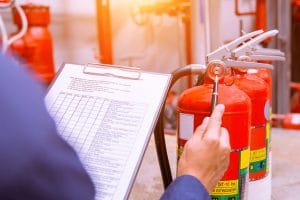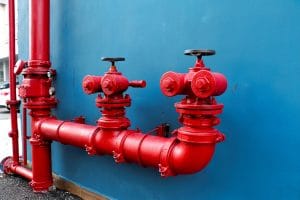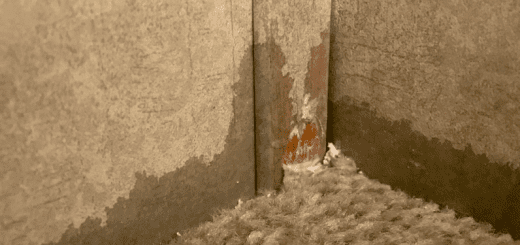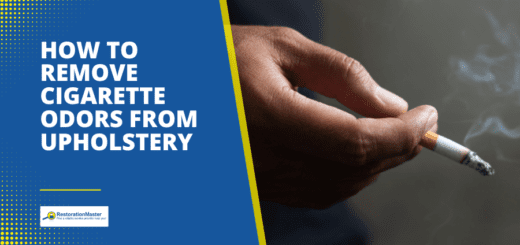What You Need to Know About Commercial Fire Sprinkler Systems
When flames erupt in a commercial space, a fire sprinkler system reduces the likelihood of extensive fire damage. In combination with a smoke alarm, the fire sprinklers offer businesses protection from catastrophic flames.
Property owners may question the usefulness of fire sprinkler systems. Becoming aware of the value of commercial fire sprinkler systems is essential to proper building maintenanceMaintenance is the routine care, inspection, and repair of a... More and employee safety.
Fire sprinklers work when no one else does.
It’s the weekend or after business hours. A fire breaks out in a stash of cardboard boxes in a corner of the warehouse. The fire sprinkler system senses the heat and gushes water onto the flames. The fire is put out even before the firefighters arrive.
Business managers and employees are simply not around the commercial property 24 hours a day to tackle a fire. A fire sprinkler system is alert 24/7.
Fire sprinkler systems are a valuable financial investment.

The fire sprinkler system senses the heat and gushes water onto the flames. The fire is put out even before the firefighters arrive.
The cost of installing a fire sprinkler system is equivalent to installing new carpeting. New commercial properties can expect to pay $1 to $2 per square foot, which includes both installation and equipment. Owners of older buildings shell out more to retrofit the property, typically $2 to $7 per square foot. Building managers of high rises pay on average $2 to $4 to retrofit the space. Historic buildings are pricier, costing $10 per square foot to install the sprinkler systems.
While some property managers aim to cut expenses by failing to install a fire sprinkler, the consequences of a devastating fire, including damage to equipment, goods and possible loss of lives, are far costlier.
Installing a fire sprinkler amounts to insurance discounts.
Building owners who install fire sprinkler systems in their commercial property receive steep reductions in their insurance premiums. Depending on the type of building, insurance discounts range from 10 to as much as 60 percent. Experts point out that installing a fire sprinkler system pays for itself when factoring in the insurance premium deductions.
Fire sprinklers almost never accidentally go off.
Sprinkler systems rarely spout water without a heat trigger. Approximately 1 in 16 million sprinklers backfire, and this is due to manufacturing defects. Sprinklers are heat activated. Water jettisons out of the sprinkler heads closest to the heat source—the flames. Not all sprinklers will automatically spurt water because one sprinkler head is activated. Up-to-date sprinkler design and technology prevents unnecessary water damage. Plus, it takes only one to two sprinkler heads to control most fires.
Fire damage is worse than water damage.
Business owners commonly assume that water damage from a sprinkler outweighs fire damage. The reverse is true. Fires cause millions of dollars in structural damage and curtail employee productivity for an extended period.
A fireman’s water hose expels up to 150 gallons of water per minute. In contrast, a sprinkler head releases up to 24 gallons of water per minute. Firefighters direct eight times more water from their hoses into the blazing fire than a sprinkler system. Controlling flames as soon as they break out results in far less damage than letting a fire run its course until help arrives.
Sprinkler systems work best with monthly maintenanceMaintenance is the routine care, inspection, and repair of a... More.
While installing a sprinkler system is prudent, a fire sprinkler system requires regular maintenanceMaintenance is the routine care, inspection, and repair of a... More. Without proper upkeep, a sprinkler cannot function when the urgent need arises. A corrosion monitoringMonitoring is the ongoing observation and measurement of con... More system keeps the pipes in check. Additionally, the draining process should undergo regular inspections. Plus, a building’s low water pressure can affect how the sprinkler works. Monthly sprinkler inspections and tests are important. Quarterly dry testing is also recommended.
Four sprinkler types are available to suit various business needs.

The fire sprinklers offer businesses protection from catastrophic flames.
Commercial properties have four primary sprinkler system options. Pre-action sprinklers are ideal in buildings that house valuables, like art and public records. Water is not stored in the pipes and only travels through the pipes when the fire occurs. Wet pipe sprinklers are ideal for high rise buildings, due to the low maintenanceMaintenance is the routine care, inspection, and repair of a... More requirements. In wet pipe systems, water remains in the pipes to allow rapid response to a fire. Dry pipe systems are perfect for warehouses without temperature control. Water is not stored in the pipes, so the pipes will never freeze and burst. A deluge fire sprinkler system is triggered by smoke and heat detectors and is often used where highly combustible materials are present, like in oil refineries and chemical plants.
Firefighters respond to a fire quickly, but is it quick enough? Responders arrive on the scene within 8 to 12 minutes. Within that short span, a fire has the capacity to overwhelm a commercial property, causing devastating losses in equipment and files. A sprinkler system activated by the heat, however, squashes the flames long before the firetruck screeches to a halt outside your property. Smoke may linger, but the extinguished fire has no chance to spread. Fire sprinklers even save lives.
When any part of your property is engulfed in flames, your commercial sprinkler system will control the fire. Although the sprinklers limit the devastation, your building may suffer from smoke and sootSoot is fine black particles composed of carbon and other ma... More damage. The charring effects of fire should be addressed by a fire damage restorationFire damage restoration is the process of repairing and rest... More company right away to limit the damage.
Skilled technicians will arrive onsite quickly to inspect the resulting sootSoot is fine black particles composed of carbon and other ma... More, smoke and water. Specialists work to clean, decontaminate and restore affected goods, plus walls, ceilings, floors, and structural components. Infestations of moldMold is a type of fungus that grows in damp or humid conditi... More or mildewMildew is a type of fungus that grows on damp surfaces, typi... More are swiftly hindered with antimicrobial applications or environmentally friendly sanitization solutions. Once a thorough sanitization of the space is completed, a final inspectionInspection is the careful examination and assessment of a pr... More is performed to ensure a quality restorationRestoration is the process of returning a property to its pr... More. The professionals also work with your insurance company to help file claims.
RestorationRestoration is the process of returning a property to its pr... More professionals recognize the urgency of fire damage restoration. Representatives will dispatch a skilled team to your property before the damage has the chance to spread.












